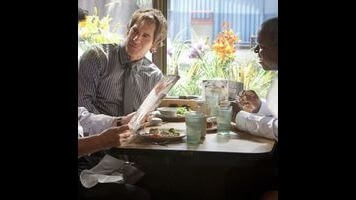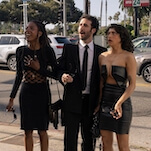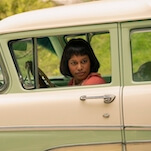I work at home, completely alone from about 8 a.m. to 3 p.m. (which is when my kids’ school day is done). By the time my wife gets home at 5, there’s a lot I want to talk about: my work, her work, the news of the day, the kids’ schoolwork, what’s for dinner, who’s doing which chore, and dozens of other tiny tidbits that have been accumulating. But our children are talkative, so they tend to get first shot at telling her about their day, and then later there’s TV to watch and more work to do (those two tasks tend not to be separate in our household), and so some things go unsaid. We have to get a sitter and go out to dinner alone together every couple of weeks, just so we can catch up.
So yes, I identified strongly with one of the major observations about human behavior in “The Great Escape,” the latest episode of Men Of A Certain Age: that sometimes we have something to say, and feel restless until we can find a willing ear. (It’s a common situation in relationships, really, beyond just conversation: one partner’s in one place while the other partner is somewhere else.) As I’ve said many times, one of the reasons I enjoy Men Of A Certain Age so much is because the writers, directors and cast are so attuned to those small, complicated social interactions that make up so much of our days. This kind of observational approach is fairly common in sitcoms, as in Seinfeld or How I Met Your Mother, which make a joke out of “close talkers” or “the cheerleader effect” by giving ephemeral concepts a name. But Men Of A Certain Age is rarely that shticky. The moments the show pinpoints, such as that conversational lag between friends or partners, often pass by unheralded—and sometimes without dialogue.
“The Great Escape” is the best Men Of A Certain Age episode since season one’s “Go With The Flow” (the one where Joe spends the entire episode recounting the details of a disastrous first date), and it works for similar reasons. It’s well-contained, taking place over the course of about 24 hours, during which our three heroes each have late night epiphanies. And it’s very precise about the myriad ways that people fail each other—or at least make each other uncomfortable.
For example, at Thoreau Chevrolet, Owen is anxiously watching his idle sales staff when rival car-dealer Evan Scarpula walks in (played by the eternally skeevy Todd Stashwick), talking about corporate downsizing while brandishing an empty coffee cup, as a way of showing that his own dealership is successful enough to have a gourmet coffee bar in the lobby. Evan even makes Owen find him a wastebasket, as a power play. Then he offers to buy Owen out, for what appears to be a “take a few years off and decide what you want to do next with your life” kind of sum. Owen reflexively says he’s not interested and wads the paper up, then rushes home so he can look after the kids while his wife Melissa begins another late night of writing product reviews for Amazon. But when Owen slips out of his suit and tie and into his pajamas, he pulls the now-unwadded paper back out of his pocket and gives it a good, long look. And though she’s really too busy to talk, Owen can’t not come to Melissa with all this, to get her opinion.
The whole Owen-Melissa sequence is a lot of fun, as she enlists him to help her test out products as he talks through the Scarpula offer, while he gulps down wine and considers what might be. Gradually, they talk themselves into a state of giddy excitement over the possibilities: Melissa could go back to being a writer full-time, while Owen could look after the kids until the youngest is old enough to start Montessori. (“Montessori is awesome!” a tipsy Owen enthuses.) Flush with the romance of it all, husband and wife make love on a pile of product samples—themselves emblematic of potential—then wake up to a much less rosy reality. Of course Owen’s not going to sell. He has employees to consider, including his good friend Terry. Plus he’s responsible for the legacy of his father, who made Thoreau Chevrolet what it is (for better or worse). Instead, Owen Jr. pushes Owen Sr. to add a body shop to the dealership. So at least that’s some progress in his life.
Joe, meanwhile, gets two storylines in this episode. In one, he accompanies Manfro on a night on the town—Manfro’s last before starting chemotherapy. From the start, Joe tries to give himself multiple outs, saying that he’s got to get up early because he has “a golf thing,” but Manfro growls, “I don’t want to hear this shit on my last night with hair,” and peer pressures Joe into staying up late with him and going to a strip club. I’m fascinated by the Joe/Manfro relationship because it’s another example a real-world situation rarely explored on TV: the friends who aren’t really friends. Manfro considers Joe a pal, but Joe finds Manfro creepy and bullying, and potentially dangerous given his connections to the world of gambling. He hangs out with Manfro mainly out of a sense of obligation, and though I think Joe enjoys their time together a little, if Manfro disappeared completely, Joe would probably breathe a sigh of relief. I have friends to whom my immediate, honest reaction is, “Hey! Great to see you!” And then there are some friends who make me cringe a little. Manfro’s kind of a cringe-friend for Joe.
Joe also wants to rush through his night with Manfro because his ex-wife Sonia is feeling emotionally fragile after breaking up with her boyfriend Harold, who’s been cheating on her. “I guess that’s my comeuppance, huh?” Sonia says in a fit of self-loathing, referring to her own unfaithfulness. Joe, who knows that his own compulsive gambling was just as destructive to their marriage, tries to finesse the trick of defusing her guilt without seeming like he’s belittling it (or like he’s flirting). At the end of his night with Manfro, Joe goes to Sonia’s house—formerly their house—and they talk about how she’s been scouring Harold’s Facebook page for clues, and how he has a little glitter on his cheek from the strip club. (Though Joe pretends the glitter is party-store-related.) Then they start to make out, but quit when they realize it feels “weird”—and just in time too, since their son Albert comes home early from practicing with his rock band.
And then there’s Terry, who has the most painful arc in “The Great Escape.” He begins by meeting Erin—whom he’s decided he “loves,” for real—at the coffee shop where Annie, one of his more significant exes, works. (Thus setting up an awkward scene in which Terry has fake-happy catch-up chatter with Annie while Erin looks at him askance, at which point Terry quickly switches the relationship back to customer-employee mode and asks, “Can I get a large black coffee?”) They then head back to his apartment where discovers that the landlord, angry at him for not keeping up with duties as the building manager, has put a lock on his door. (“He always does this,” Terry sighs. “Well, very rarely. But this is what he always does.”) Erin suggests that he could stay with her, which leads to a well-crafted, wordless montage of Terry stepping into her bathroom and unpacking travel-sized toiletries—the kind that say “I won’t be here too long”—alongside a full-size toothbrush that looks alarmingly permanent. That night they have reassuring, couple-y sex, but then Terry wakes up in the middle of the night and hears Erin sobbing in the bathroom. She tells him that she’s still semi-seeing her old boyfriend Randy, and that she feels like she should try and make that relationship work because it’s been going on longer. “I can’t just throw it all away on a fling at 46,” she says, which stings Terry, who though this was more than just “a fling.” Even worse: the next morning she’s gone when he wakes up, and leaves a note that ends, “Fondly, E.”
During the first half of this season, I griped occasionally that we weren’t getting enough scenes of the three leads hanging out together, taking part in each other’s stories. The same could be said of “The Great Escape.” But the separation works here, for a couple of reasons. First off, the episode is bookended by thematically on-point scenes of the guys getting together at the diner. Early on, Joe is itching to talk to his pals about all that’s going on—“Got a Sonia thing, some sports stuff… got a ton of questions about my pee-stream”—but is stymied because they’re all rushing out the door. (“I’m gonna text you the thing about my pee,” he says as Terry dashes off.) Later, Joe finally gets to talk, but the camera holds an extra beat on Terry, who has plenty to say himself and will have to wait his turn—if that turn ever comes.
And though this episode does keep the guys apart for most of the hour, their separate adventures run more or less parallel. All three have sex (or almost do, in Joe’s case), and all three at some point in the evening see new horizons opening up: Owen with his business, Terry with Erin, and Joe with the possibility that he might get back together with Sonia. But everything’s different in the morning. “The Great Escape” opens with The Shirelles’ uptempo hit version of Carole King’s “Will You Love Me Tomorrow?” then ends with the King’s own, more plaintive version, recorded recently with James Taylor. Both recordings have strains of melancholy and yearning, but the first version has some youthful, hopeful spark. In the second version, King sings as though the question she wants so desperately to ask already has an answer.
Grade:
Stray observations:
- Joe’s daughter Lucy suggests that her mom’s strange behavior could be attributed to her going through “the change.” Albert immediately asks, “What’s the change?” When Joe doesn’t answer right away, Albert says, Dad?” And Joe, still trying to figure out how to answer this—or how to get out of answering it—stares straight ahead and mutters, “Yeah, I heard ya.”
- Nice bit of teacher-detail as Erin has to spend her evening grading “forty short-answer tests.”
- “I’m going to sleep. Over.”
- Manfro invents a word which he says means “anything from the douchebag family.”
- Terry explains his cooking skills: “The secret is to become an actor, and then never get work.”
- Manfo insists that the attention he’s getting at the strip club is due to his awesome “magic” shirt. “Plus, we’re payin’ ‘em,” Joe notes. “We all pay in the long run,” Manfro shrugs.
- Manfro does though bond with his lap-dancer over his cancer. She gives him his number, he calls it, and she ends up accompanying him to his chemotherapy, after he told Joe he’d decided not to go. So at least one of these guys had a successful night.
- “I was old man-in’ it.”
- Terry wants everyone to hike Mt. Whitney with him for his birthday. Possible season finale?









































